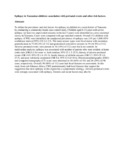| dc.description.abstract | To define the prevalence and risk factors for epilepsy in children in a rural district of Tanzania by conducting a community-based case-control study.
Children aged 6-14 years with active epilepsy (at least two unprovoked seizures in the last 5 years) were identified in a cross-sectional survey in Tanzania. Cases were compared with age-matched controls.
Overall 112 children with epilepsy (CWE) were identified; the unadjusted prevalence of epilepsy was 2.91 per 1,000 (95% confidence interval [95% CI] 2.4-3.5). The main seizure types were focal motor with secondary generalization in 73 (65.2%) of 112 and generalized convulsive seizures in 19 (16.9%) of 112. Adverse perinatal events were present in 16 (14%) of 112 cases but in no controls. In multivariate analysis, epilepsy was associated with number of parents who were resident at home (odds ratio [OR] 6.2 for none vs. both resident, 95% CI 1.5-25.5), history of adverse perinatal events (OR 14.9, 95% CI 1.4-151.3), family history of afebrile seizures (OR 5.7, 95% CI 1.0-27.5), and poor scholastic attainment (OR 8.6, 95% CI 4.0-18.4). Electroencephalography (EEG) and computed tomography (CT) scans were abnormal in 44 (44%) of 101 and 26 (29%) of 90 cases, respectively. Overall, 98 (88%) of 112 cases had focal features on assessment.
In this study from sub-Saharan Africa, CWE predominantly had focal features that support the suggestion that most epilepsy in this region has a symptomatic etiology. Adverse perinatal events were strongly associated with epilepsy. Genetic and social factors may also be | en |

